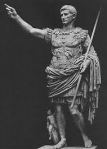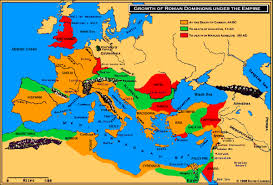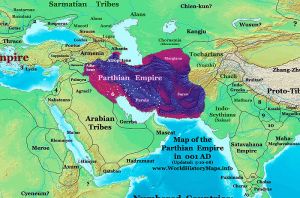(I have recently discussed the civil war that finally brought an end to the Roman Republic [Stuff from Way Back #21: Antony, Cleopatra and Who?] and the establishment of the Principate by Augustus [Stuff from Way Back #26: Image is Everything], and it seems appropriate to continue the story – on to the final collapse of the Empire. And the story of the early Empire should shed a wee bit of light on the question of dictatorship versus chaos in the Middle East. Incidentally, for the Julio-Claudians I highly recommend the old BBC series I, Claudius, but keep in mind that Livia did not kill any of the people she is accused of.)
The almost complete failure of the Arab Spring and the chaos of Syria and Iraq (and soon Afghanistan) have raised again the question of whether even a dictatorship is preferable to the disorder, destruction and death now widespread in the Arab world. The answer of course depends on the nature of the dictatorship and the depth of the disorder. The rule of the Athenian tyrant Peisistratus was for the average Athenian clearly preferable to the constant mismanagement of the state by the oligarchy of wealth he overthrew, and even life under the deadly thumb of Joseph Stalin was better than the utter disaster of the Russian Civil War.
Five thousand years of civilization have not been so much a struggle for freedom as one for security and comfort. With a few exceptions, such as classical Greece, the Roman Republic and much of the world in the last century or two, the average human has been quite willing to surrender political freedom for a tolerable life. In fact, there has rarely been anything to surrender, since political freedom has been a very scarce commodity until recently. Further, even now people can be satisfied with the illusion of political participation and liberties so long as they can enjoy the good life.
A recent opinion in Der Spiegel has argued that there are no functional or stable dictatorships, since they all contain the seeds of their own collapse. This may often be true insofar as the long haul is concerned, since the death or overthrow of an autocrat frequently leads to a contest for power and consequent disorder. On the other hand, because of traditional dynastic succession absolute monarchy generally did a fair job of providing longer term stability, and even in the modern world a defined successor, as with Sadat and Mubarak in Egypt, can preserve stability across a transition of power.
The same article, however, boldly stated that “There is no such thing as a benevolent dictatorship,” which strikes me as an absurd assertion. Ask the Athenians about the difference between the Peisistratid dictatorship and that of the infamous Thirty Tyrants who briefly ruled Athens after her defeat by Sparta in 404 BC. Autocracy can in fact provide excellent government. The rub is in guaranteeing that you have a good autocrat.
This was one of the problems faced by Octavian after his defeat of Antony and Cleopatra in 31 BC. The only alternative to yet more disorder and civil war was a stable dictatorship based on military support; there was simply no way to return to the wealth-dominated democracy of the Republic. He certainly did not solve the problem of guaranteeing that the dictator would always be competent and benevolent, but he did create a structure that with two brief interruptions secured imperial stability and prosperity for almost a quarter of a millennium. Despite the long Roman experience of popular legislative assemblies and elections, a rarity in the pre-modern world, democracy could not have achieved this.
This period, from 14 BC to AD 235, is called the Principate, because there was theoretically no office of dictator or emperor. Octavian, who took the name Augustus, understood the importance of image in politics and created a sham Republic, in which he was voted by the Senate all the powers associated with the Republican offices, including control of the military, without having to hold any of them. Thus, he was not Emperor or Dictator or Consul for Life but simply the Princeps or “First Citizen” in the restored Republic. That this “Republic” was an autocracy was obvious to anyone with any intelligence, but it made the bitter pill of a dictatorship easier for the former ruling elites to accept.
A traditional problem with autocracies is their tendency to become dynastic, which of course does not guarantee competence on the part of the successor; even supposedly communist North Korea has followed a dynastic succession. Compounding the problem for Augustus was the need for the Princeps to have a Julian connection, since the army was unbelievably impacted by C. Julius Caesar and loyal to his memory. The idea was to select a promising member of the family and groom him as successor, easing him into power until he was virtual co-ruler with the Princeps. Because of deaths, Augustus was forced to choose his adopted stepson, Tiberius, a Claudian, as his heir, and consequently the initial dynasty of the Principate is called the Julio-Claudians. (See the chronological table at the end of the article.)
Tiberius was virtually co-ruler when Augustus died, and the change of power was smooth. That Tiberius was a well-known general among the Rhine legions compensated for his lack of a direct blood connection to Caesar. The Roman people were delighted by the Principate, but the Senatorial elites were not, dreaming of the true Republic and forming conspiracies, making it even more difficult for the gruff Tiberius, who would have preferred to be with the troops than in Rome, to play the sophisticated game Augustus had set up. Not that it mattered. He was succeeded in AD 37 by the twenty-five year old C. Caligula, son of his immensely popular brother Germanicus. “Bootsie” (Caligula is the diminutive of caliga, the legionary boot, a tiny pair of which Caligula had as a child on the Rhine.) was also popular, but six months into the office he had some sort of nervous breakdown and became completely irrational. The sham Republic of the Principate now had a first citizen who proclaimed himself a god.
Thus, a little more than two decades after Augustus’ death Rome was confronted with the problem of how to get rid of a bad Princeps. The only answer of course is assassination, and he was killed in AD 41 by insulted members of the Praetorian Guard acting in concert with members of the Senate hoping to choose their own successor or restore the Republic. Other members of the Guard, however, found Caligula’s uncle Claudius and proclaimed him emperor, whether with Claudius’ connivance or not is unclear. Many thought Claudius, a fifty-year old scholar who had a number of infirmities, to be a fool, but fortunately for Rome, he turned out to be an excellent administrator.
Claudius himself died in AD 54, and the consensus is that he was poisoned by his last wife, Agrippina, whom he had married because of her Julian connections. He was succeeded by her son, Nero, whom Claudius had elevated above his own son, Britannicus, presumably because Nero was older and was much more a Julian, important in retaining the loyalty of the military. Agrippina probably feared he might change his mind or simply wanted her son emperor while he was still young enough to be dominated by her. In any event, Nero killed both Britannicus and after several failed attempts his own mother. Nero was a terrible Princeps, ignoring the administration of the Empire in favor of his aesthetic interests (he competed in music and poetry in the Olympics) and his building programs, which drained the treasury.
Growing opposition from the Senatorial class pushed Nero further into tyranny and executions, and he was losing the support of the urban mob as well. More important, he ignored the military, never showing himself at the camps and even appointing his freedmen (ex-slaves) as commanders. He was creating the environment for a revolt, and matters came to a head in AD 68, when the military basis of the Principate became perfectly clear in the “Year of the Four Emperors,” AD 68-69.
AD 68 one of the governors in Gaul, C. Julius Vindex, raised the standard of revolt and freedom from the tyrant. He was easily defeated, but fearing for his life because of his association with Vindex, Ser. Sulpicius Galba, one of the Spanish governors, prepared to march on Rome, supported by the governor of Lusitania, M. Salvius Otho. Nero had troops available near Rome, but despaired when his Praetorian Prefect suddenly disappeared and he learned the Guard had accepted a massive bribe from an agent of Galba. The other provincial armies began revolting, the Senate declared for Galba, and Nero committed suicide with the help of a slave, declaring what a real artist the world was losing.
That was it for the Julio-Claudians. There were simply no more male Julians available, and while the armies may have been reluctant to recognize a non-Julian (even though there was now no one left alive who could remember Caesar), they and the Praetorians were not about to accept a return to the rule of the Senate. Galba thus became the first non-Julio-Claudian Princeps. He did not last long. The military did not trust the seventy-three year old Senator, and no one liked his austerity program, especially the Guard, whose promised bribe was not paid. One of the Rhine commanders, Aulus Vitellius began marching on Rome, while Otho, feeling cheated by Galba, appealed to the Praetorians and soldiers in Rome, who proclaimed him emperor and murdered Galba in January of AD 69.
Otho might well have been a good Princeps, but the German legions following Vitellius refused to declare for him, and while he had the support of some seventeen legions, they were scattered about the Empire. In April he was defeated by Vitellius’ forces at Bedriacum in northern Italy, and though he still had considerable resources, he committed suicide to spare Rome a protracted civil war. Vitellius was now Princeps, but already in trouble. Off in the east T. Flavius Vespasianus, the commander finishing off the First Jewish Revolt, was persuaded by his troops and the eastern governors to take his shot at the imperial purple. The Egyptian, Syrian and Danubian legions all joined him, and the Vitellian troops, beset by desertions to Vespasian, were defeated by Flavian forces at the second battle of Bedriacum and the battle of Cremona. The indolent and gluttonous Vitellius negotiated an abdication, but his troops went on a rampage in Rome, killing Vespasian’s brother (and ominously burning down the Temple of Jupiter Optimus Maximus), and Vitellius came out of retirement, only to be defeated and killed by Flavian forces, who themselves then sacked Rome.
Vespasian was Princeps. The Julio-Claudians had governed Rome for ninety-five years, and after a relatively brief and limited struggle their dynasty had been replaced by the Flavians. Tacitus, an historian of this period, declared that the secret of empire was now out: one did not need to be in Rome to become emperor. Nor, it can be added, did one need to be a Julian – or by implication, of any particular noble family. The Year of the Four Emperors had made it vividly clear to the troops and certainly their generals that they were the basis of political power in the state, but the legionaries of the first century were not the self-interested scum of the Anarchy. They were still disciplined and loyal to the idea of the Roman state and Empire, and following the victory of Vespasian, they returned to their camps and did not leave in serious numbers again for another hundred and twenty-four years.
Vespasian is the Lyndon Baines Johnson of the Principate. He was a no-nonsense and determined leader, well educated, but presenting the shrewdness of the farmer of central Italy, from which his family came, rather than urban cleverness. His ever active wit was more rustic than sophisticated: when on his death bed, knowing that he would be posthumously deified, he quipped “I feel myself becoming a god!” Given his character and how he came to power, he could hardly pretend simply to be the First Citizen, but he was willing to respect the Senate and involve them in the administration of the Empire, though he was constantly opposed by the Stoic philosophers. And he surely looked like LBJ.
Vespasian restored confidence, peace and prosperity in the Empire, and the succession of his son T. Flavius Vespasianus in AD 79 was completely smooth. Titus was remembered as one of the best Principes, though his poor health only allowed him two years of rule. The only memorable events of his administration were the dedication of the Flavian Amphitheater (the Coliseum), begun by his father, and the eruption of Vesuvius, which destroyed Pompeii and Herculaneum. Though he had not been designated heir, Titus was followed by his younger brother, T. Flavius Domitianus.
Domitian is remembered as a cruel tyrant, but this is a grand exaggeration of the Senate that conspired to kill him and hostile historians such as Tacitus. He was far more openly autocratic than his father and did seemingly possess a cruel streak, which may explain why he was not politically prepared by either his father or brother. Senatorial opposition and his fears created a cycle of conspiracy and execution, which resulted in his assassination in AD 96. But he was a capable administrator and popular with the army, securing the imperial stability that preserved peace and prosperity, and in that regard he must be regarded as one of the better Principes. But the Flavian dynasty had come to an end. What now?
As expected the Principate had evolved, most obviously in becoming more openly autocratic. A signpost along the way was the legal mechanism of Vespasian’s accession. Whereas Augustus had all his powers voted to him by the Senate in bits and pieces, Vespasian became Princeps through a single law, the Lex de Imperio Vespasiani, a step that further defined an actual office of emperor. While Caligula and Nero might be considered aberrations, the autocratic Flavians were competent rulers and their administrations beneficial for the Empire, which certainly helped smooth the way for a growing acceptance of an outright Emperor. The weaknesses of dynastic succession had become very apparent, both in the accession of completely unsuitable rulers and in the emergence of powerful advisors, generally freedmen, who essentially ran the government under a weak Princeps. Even Claudius, an excellent ruler, relied heavily on his Greek freedmen, Pallas and Narcissus, who could often sway the Princeps to a particular course of action. History has shown again and again that personal access to the autocrat, especially if he is weak, is a tremendous source of power for individuals who are otherwise merely servants – consider the administration of Bush junior.
Meanwhile, the Senate’s position as a partner in the Principate was shrinking. The Senatorial class was still a source of administrators for the Empire, but the Senate itself had to satisfy itself with relatively trivial matters, and its role as a serious decision-making body was disappearing. It would appear also that by the end of this period Senatorial dreams of the Republic had finally died: when Domitian was assassinated, there was no talk of restoring the Republic, but simply choosing their own candidate for Princeps.
Finally, the military and the Empire remained strong. After the loss of three legions in the disaster in Germany in AD 9 Augustus had declared that the Empire had reached its largest sustainable extent, and with the exception of Claudius’ invasion of Britain in AD 43 for political reasons, this was adhered to. The Flavians completed the occupation of Britain up to the Scottish highlands, and the addition of the island did not materially lengthen the frontiers to be defended, though the British provinces apparently never paid for their upkeep. Domitian in fact cashiered his excellent general Gn. Julius Agricola for suggesting that he could easily conquer the Scottish highlands and Ireland. The Flavians also occupied and fortified the triangle of land between the upper Rhine and Danube, thus shortening the northern frontier. If anything, the army was stronger at the end of the first century because of the work done by the Flavians in organization and equipment. It was primarily stationed in large permanent camps (many of which would become cities), especially on the Rhine-Danube frontier, but it clearly remained a field force, ready to move along the road system to any point of threat.
But in AD 96 the last Flavian was dead and the Senate had chosen its own candidate. What would the army do now?
(753)–c. 509 BC Regal period
c. 509–27 BC Republic
133–30 Revolution
30 Deaths of Antony and Cleopatra VII, supremacy of Octavian/Augustus
27 BC–AD 235 Principate or Early Empire
27 BC- AD 68 Julio-Claudians
27 BC–AD 14 Augustus
26-6 BC pacification of Spain, Alps and lands south of Danube
AD 9 loss of Germany
14-37 Tiberius
37-41 Gaius Caligula
41-54 Claudius
43 Invasion of Britain
54-68 Nero
66–70 First Jewish Revolt
68–69 Year of the Four Emperors, civil war
June 68-Jan 69 Galba
Jan-March 69 Otho
April-Dec 69 Vitellius
69-96 Flavians
69-79 Vespanian
70 Destruction of Jerusalem
79-81 Titus
81-96 Domitian


















